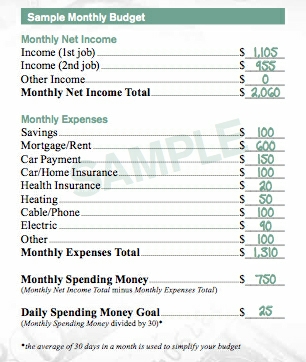Fast-Food Workers Strike over Pay
/The fast-food industry has been under fire for paying low wages. The website "Fast Food Forward," asks people to sign a petition:
"We can't survive on $7.25!
"In America, people who work hard should be able to afford basic necessities like groceries, rent, childcare and transportation.
"While fast food corporations reap the benefits of record profits, workers are barely getting by-many are forced to be on public assistance despite having a job.
"Raising pay for fast food workers will benefit workers and strengthen the overall economy."
 In July, McDonald's mistakenly publishing Practical Money Skills, a budgeting journal for employees. It was a nice idea, but the tool has made obvious that employees have a tough time living on McDonald's wages alone. A Mother Jones article criticized the advice:
In July, McDonald's mistakenly publishing Practical Money Skills, a budgeting journal for employees. It was a nice idea, but the tool has made obvious that employees have a tough time living on McDonald's wages alone. A Mother Jones article criticized the advice:
"The most practical tip: In order to obtain a living wage working at McDonald's 35 hours per week (monthly income: $1,105), get a second job. Least practical facet: as MSNBC's Maria Perez notes, it "leaves out necessary expenditures like food, child care, clothes and gas."
Another Mother Jones writer asks that we "give McDonald's a break." The row for "Income (2nd job)" assumes a dual-income family with two working adults.
A New York Times opinion from The Executive Board explains how the minimum wage has lagged behind inflation:
"As measured by the federal minimum wage, currently $7.25 an hour, low-paid work in America is lower paid today than at any time in modern memory. If the minimum wage had kept pace with inflation or average wages over the past nearly 50 years, it would be about $10 an hour; if it had kept pace with the growth in average labor productivity, it would be about $17 an hour."
Fast-food employees are paid $9, on average.
The New York Times piece also critcizes executive pay:
"At some point, as strikes continue, well-paid executives in low-wage industries will have to confront the fact that low worker pay is at odds with their companies' upbeat corporate images and their self-images as top executives. (The chief executives of McDonald's and Yum Brands, which owns Taco Bell, Pizza Hut and KFC, are among the nation's highest-paid corporate leaders.)"
An International Business Times infographic summarizes some of the data well:
A Bloomberg Businessweek article reported that wage increases will hurt already low fast-food margins. Profit margins are particularly slim for franchised restaurants, which set their own pay rates. The article compares company-owned Burger Kings, which can garner margins of over 10%, to a franchised store, which may operate at only 2%. For franchisees, the cost of higher wages may not easily be offset by raising menu prices. However, the writer concedes,
"Much of the public debate, however, is focused on raising wages to considerably less than the much-hyped $15 an hour. Wicks-Lim and 99 other economists signed a petition in July to raise the federal minimum wage to $10.50. They say the increase in costs for restaurants would equal about 2.7 percent of sales. Wicks-Lim adds that companies could then make up the difference through price increases (say, a nickel more for a burger), reduced employee turnover, productivity gains, and slower raises for the highest-paid employees."
Discussion Starters:
- Find research to support both sides of the issue. What credible sources do you find? What are the major arguments on each side?
- What examples of fallacies do you find in the arguments?
- What's your view? Should fast-food restaurants pay more? How much?



